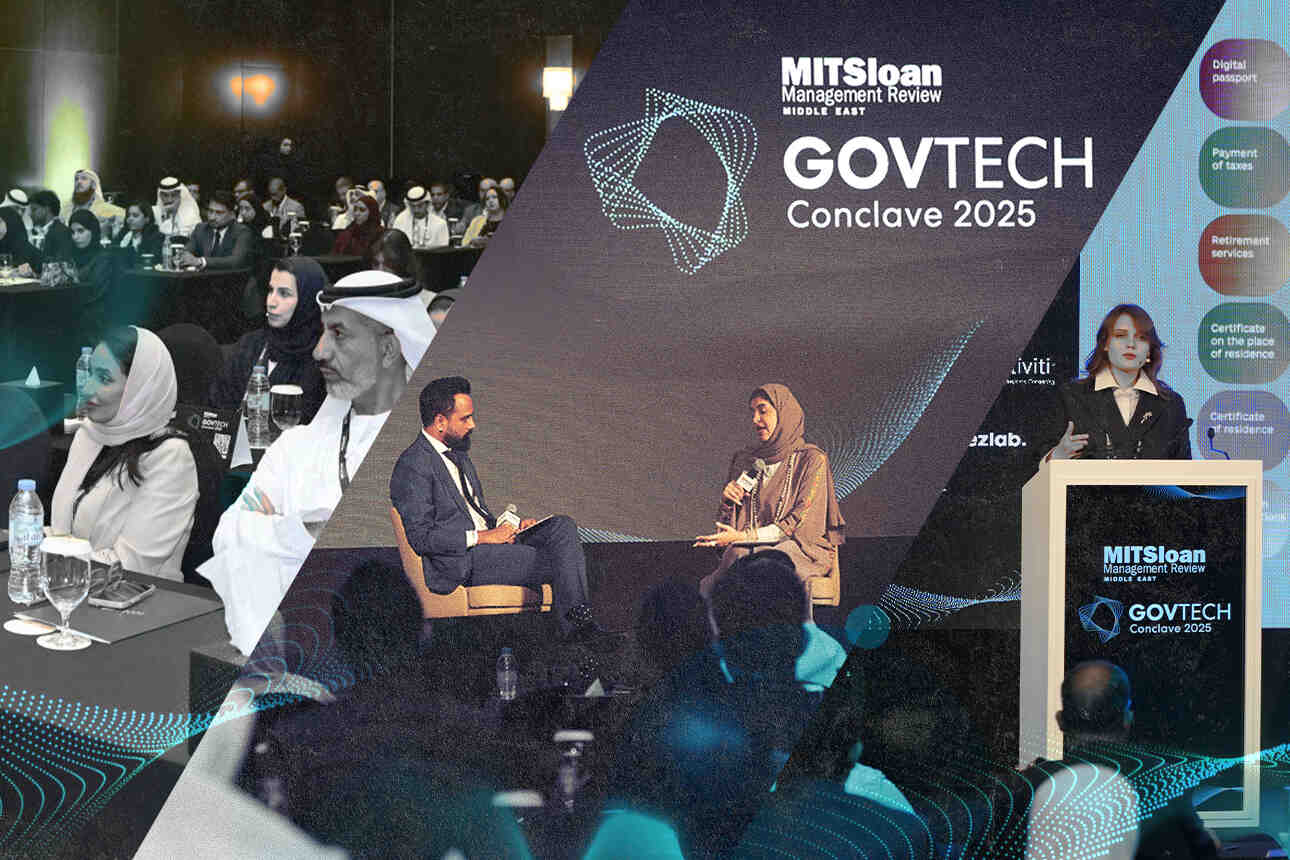GovTech Conclave 2025: The Present and Future of Effective Public Governance is AI-powered
Experts and industry leaders examine how citizen-first approaches and adaptive strategies are crucial for effective governance
News
- Talent Boomerang: Mira Murati’s Thinking Machines Loses Two Co-Founders to OpenAI
- YouTube Allows Parents to Limit Kids’ Shorts Viewing Time
- What Scott Adams' Dilbert Got Right About Power at Work
- Salesforce Rolls Out Slackbot as an AI Agent
- Zoho Launches First Middle East Data Centers in UAE
- Apple Bets on Google’s Gemini to Anchor Its AI Future

[Image source: Krishna Prasad/MITSMR Middle East]
Governments around the world are under growing pressure to deliver smarter services, faster responses, and more resilient systems—all while navigating a landscape of rapid technological change, shifting citizen expectations, and global uncertainty. Against this dynamic backdrop, GovTech Conclave 2025, hosted by MIT Sloan Management Review Middle East, convened a powerful cohort of regional decision-makers, policy architects, technology leaders, and digital transformation experts to examine the evolving role of technology in the public sector.
Held at a pivotal moment for the region’s digital agenda, the Conclave offered a timely and strategic forum to explore how government innovation is being redefined—from cloud-enabled agility and cybersecurity sovereignty to AI-driven governance and data-led policymaking. With an emphasis on cross-sector collaboration and knowledge exchange, the event featured high-level keynotes, insight-rich panels, and candid discussions that bridged vision with implementation.
Enabling Smarter Systems with AI Integration
In the inaugural session titled Redefining public sector efficiency with AI and automation, H.E. Dr. Ohoud Shehail, Director General of the Department of Digital Ajman, highlighted how generative AI is used to automate processes and enhance public services across Ajman.
“The optimal goal for government entities, not only in the UAE, is to serve people in the best way and to manage their expectations or go beyond them.”
She underscored the conclave’s central theme: technology is only as effective as the intent behind its application.
Ahmed Al Hammadi, Vice President of Cloud & Digital Infrastructure at e& enterprise, expanded on the infrastructure supporting this transformation, emphasizing the deep integration of cloud, AI, and data platforms in his keynote address. “There may be a wrong perception about that digital government, that it’s a mobile application or an online portal. It’s more than that. It’s about creating a secure, intelligent, citizen-fair system that can scale with demand and evolve with purpose,” he said.
“In the UAE, we are now focusing on impact at scale, leveraging the great synergies between the cloud, AI, and data centers.”
Human-Centered Innovation in an AI-Driven Era
An AI-powered future is highly dependent on an adaptive AI-literate workforce. To explore the next generation of work, Dr. Praphul Chandra, Professor and Director at the Atria Center for AI & Decentralized Technologies, Atria University, and Mentor at TekFrameworks, addressed the policy challenges of preparing citizens for an AI-driven future.
“To become a truly AI cognitive nation, it’s not just sufficient to teach AI tools. You have to do it in a sequence. You have to help students learn where the AI can make mistakes and how to override it,” he explained. His remarks called for a more nuanced approach to AI education — one that ensures human judgment remains central to algorithmic systems.
From a data governance perspective, Ali Alhammadi, Analytics & Data Science Section Head at the Department of Government Enablement, offered an explicit critique of outdated practices in public sector analytics. “Most of the data analytics efforts are built on traditional, ad hoc data reporting approaches, which is not right. The right data leadership and right data practice is to build that capability within the business to act on their own, report on their own, and have the proper accessibility and usability of their data with a proper role-based access model,” he said.
In addition, Khalid El Bachraoui, Managing Director of Business and Digital Transformation at Sia, stressed that public entities aim to “master data and the data infrastructure.”
“We have heard multiple times about the importance of data and data quality. So having an infrastructure where we can have data available in real-time with the right quality, with the right pace for processing, is a must-have for any scalable AI initiative within any organization,” he said.
Empowering Citizens Through Smarter, Simpler Services
Broadening the conversation to the evolving nature of work, Siddhartha Chakraborty, Head of B2B Category – Emerging Markets at Logitech, explored the new logic of digital workplaces in a keynote. “While work is a thing we do, it is also a place we go to. He said, “Workplaces must have the right infrastructure and tools to enable their teams to be more collaborative and have happier and more productive employees.”
His perspective underscored the growing importance of human-centered design in government work environments, which is a key enabler for digital transformation success.
Cybersecurity and digital identity also emerged as a critical theme at the conclave. In a session on strengthening digital identity and cybersecurity, Dr. Ebrahim Al Alkeem Al Zaabi, National Risk and Policy Director at the Executive Office of Anti-Money Laundering and Counter-Terrorism Financing, highlighted how digital identity systems will evolve in the AI era.
“When it comes to the core of digital identity as we leverage AI, it is no longer based on identification like dual factor authentication or biometric. In the future, identification will be behavior-based, and access will be granted based on user patterns in a system,” he said.
Speaking on the operational realities of transitioning to cloud-based systems, Hamzah Al Najjar, Senior Manager of Compliance & Security Assurance at AWS Middle East, North Africa, and Turkey, emphasized that cloud readiness begins with intent and internal reform. “The most important aspect in shaping a cloud-ready government is the willingness of government entities to move to the cloud. This step mandates their policies and procedures, which means even thinking about smaller aspects like procurement.”
In a keynote focused on AI-driven citizen engagement, Ziad Madanat, Regional Director of MENA at Verint, delivered a practical message about the importance of foundational process improvement before adopting new technology.
“Adding AI to a broken process is not a solution. You must ensure your processes within your contact center and organization are efficient and not broken. Organizations must never buy AI — they must buy the outcomes they want from AI,” he said. His remarks served as a reminder that successful public sector transformation depends as much on strategic clarity and operational discipline as on technological sophistication.
During a keynote on the future of the delivery of citizen services, Hanief Sallie, Vice President at Teleperformance, expanded on the role of emotional intelligence and human-centered design in citizen services. “Citizen services are very personal. The human touch is still essential in an AI-first ecosystem. An expert human must always be at the core of AI adoption and leveraging, and as we move to agentic AI — autopilot becomes extremely crucial to the ecosystem.”
Building on this citizen-first approach, Adib Ibrahim, Managing Director at Protiviti Middle East, offered insights into how governments can co-create smarter services with the help of broader ecosystems. “The first step is to simplify your services so citizens can easily access them. The next step is to involve the wider ecosystem and other stakeholders to innovate, such as by crowdsourcing ideas and designs,” he shared.
The event concluded with a thought-provoking keynote from Prof. Kenneth Oye, Director of the Program on Emerging Technologies at MIT, who addressed how governments can plan for the long-term implications of AI. “Adaptive strategies are the way to handle uncertainties. You don’t want to go with a laissez-faire approach as endorsed by tech bros or a precautionary approach suggested by critics of AI. In response to uncertainty, planning ahead is crucial,” he said, underscoring the importance of balanced, foresight-driven governance frameworks that can evolve alongside emerging technologies.
As the global public sector continues to navigate the challenges of data privacy, algorithmic transparency, and digital trust, the conclave reinforced a shared vision: the future of governance is intelligent, ethical, and deeply human-centered.









